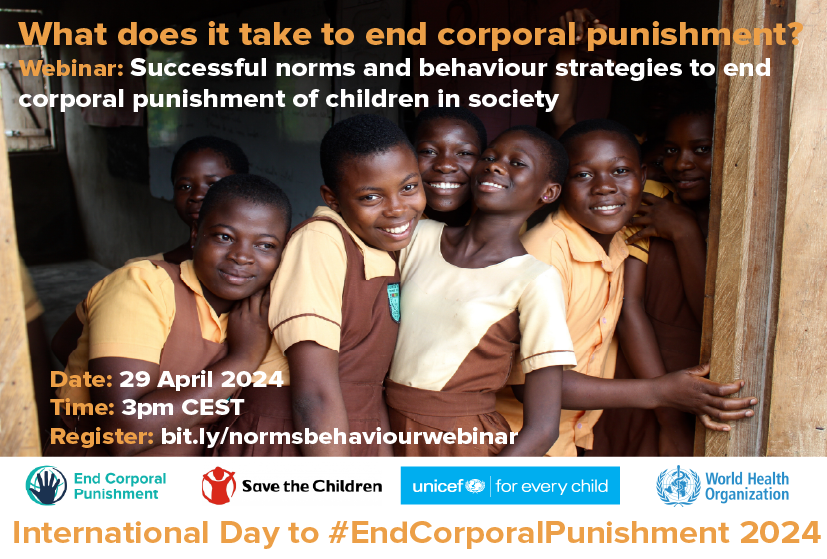Webinar: What does it take to end corporal punishment of children?
Successful norms and behaviour change strategies to end corporal punishment of children in society
Date: Monday 29 April 2024
Time: 8am Bogota/3pm Geneva/9pm Manila
Length: 1.5 hours
Language: English
Register: HERE
Context
Corporal punishment is the most common and widely accepted form of violence against children, with vast numbers regularly experiencing it in multiple settings of their lives. Worldwide around 4 in 5 of all children aged 2-14 years are subjected to violent punishment in their home every year.[1] Research has found strong evidence connecting corporal punishment with multiple short - and long-term harmful impacts for the child and society. The acceptance and prevalence of corporal punishment is underpinned by harmful social norms including those associated with children and their rights, gender and violence.
Globally, only 14% of children are fully protected by law from corporal punishment. Its widespread social acceptance and prevalence means that a degree of violence in child rearing is normalized. As the smallest and most vulnerable members of society, children deserve more, not less, protection from assault.
However, progress is possible and accelerating! 40 years ago, only Sweden and Finland had passed a law banning corporal punishment, but today 65 states across all world regions have taken this fundamental step in protecting children and upholding their rights.
Enacting a prohibiting law is essential but not sufficient to end corporal punishment. Evidence shows that when a law is well implemented and embedded within a systemic approach addressing harmful social norms that drive violent behaviour, though public education, discourse and caregiver skills and support, among others - a substantial decline in the prevalence of violent punishment can be seen over time.[2]
This webinar provides an opportunity to learn more about strategies to reduce social acceptance and use of corporal punishment, both at scale and in specific contexts and locations.
Objectives
- Promote action to end violent punishment of children as an urgent global priority.
- Increase understanding of strategies to complement legislation in efforts to end corporal punishment, including those designed to challenge the social acceptance of violence and support caregivers to adopt positive, non-violent child raising methods.
Audience
Legislators and policy makers; child protection and violence prevention professionals and organisations; public health advocates; children and human rights advocates; positive parenting professionals and organisations; NGOs, parents and carers, civil society and faith groups; academics and students.
Speakers and their topics
| Hosts: Sonia Vohito and Bess Herbert, End Corporal Punishment | |
| Etienne Krug MD, MPH, Director, Social Determinants of Health, World Health Organization | The public health imperative for concerted action to end corporal punishment |
| Stephen Blight, Global Head of the UNICEF Violence Against Children Unit | UNICEF’s strategic approach to ending corporal punishment |
| Ramadhan B. Kirunda, Technical Advisor on Adaptations, Scale-up and Quality Improvement at Impact and Innovations Development Centre | Introduction to social norms, and norms- and behaviour-change strategies to end violence against children |
| Professor Joan Durrant, Professor Joan Durrant, Professor (Senior Scholar), College of Medicine, University of Manitoba. Executive Director, Positive Discipline in Everyday Life | The role of laws prohibiting corporal punishment of children in changing norms and behaviour: evidence from Sweden, Germany and New Zealand |
| Dan Rono, Chief of Child Protection, UNICEF Nepal | Implementing UNICEF’s strategic approach to ending corporal punishment in Nepal - strategies to prevent violence against children in homes, schools and communities |
| Joanne Stevens and Michelle Playle, Children’s Rights Team, Welsh Government
| Strategies to change norms and behaviors at scale: Putting the Welsh prohibition of corporal punishment into practice, three years on |
| Katongo Mwansa, Child Protection Technical Specialist, Save the Children Zambia Debbie Kangombe, Project Manager, Save the Children Zambia Mathilde Schilling, Safeguarding Behavioural Science Specialist, Save the Children | A Focus on Zambia: Putting laws on corporal punishment into practice through behavioural science and targeted interventions in schools and families |
| Steve Miller, Global Director of Child Protection at Save the Children International | Closing remarks and call to action |
[1] UNICEF (2014), Hidden in Plain Sight: A statistical analysis of violence against children, NY: UNICEF
[2] The-positive-impact-of-prohibition-of-corporal-punishment-on-children.pdf (endcorporalpunishment.org)
- Find out about plans for the International Day to #EndCorporalPunishment 2024 and how you can get involved
- Have a look at our Advocacy Pack, available in Spanish, French and English

